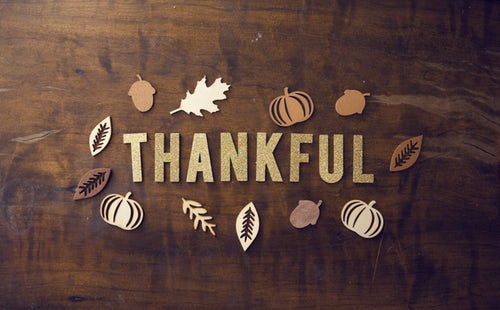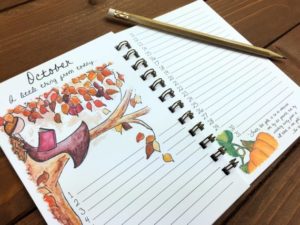

‘Tis the season to give thanks, and it turns out counting your blessings is actually good for you. Tina B. Tessina, PhD, a California-based psychotherapist and author of It Ends with You: Grow Up and Out of Dysfunction tells us, “Happy people have an easier life, bounce back from problems, and generate love. Research demonstrates we are hard-wired to focus on problems, which creates physically and emotionally damaging stress.” But Dr. Tessina has seen clients improve their well-being by changing their behavior. “Practicing gratitude helps you notice good things, reduce your stress and anxiety, and feel better about yourself, your friends and family, and your life.”
Laurie Santos, PhD, a psychology professor at Yale University, teaches the most popular course in Yale’s history, The Science of Well-Being, also available to anyone online at Coursera. Dr. Santos explains, “Research shows that happy people tend to take time for gratitude more regularly—they tend to naturally be more grateful.”
Why gratitude can be so difficult

For many of us, though, practicing gratitude doesn’t come naturally. Ashley J. Smith, PhD, a licensed clinical psychologist who has spent more than a decade treating anxiety and related disorders, says, “From an evolutionary perspective, our brains are programmed to notice and remember the negatives. It paid off for cavemen to remember where danger was.” Noticing and remembering the positives wasn’t as important for survival. And Dr. Smith says, “In today’s modern world, our survival isn’t as threatened, but our brains haven’t evolved that much. We still notice the negatives more readily than the positives, and negatives get encoded in our memory almost immediately, whereas it takes positives significantly longer to get encoded.”
“An intentional gratitude practice can increase how automatically and quickly your brain notices the positives.”
The good news, according to Dr. Smith, is that “we can essentially reprogram our brains—neuroplasticity is a great thing!” An intentional gratitude practice can increase how automatically and quickly your brain notices the positives. Dr. Smith says a gratitude practice can also help you savor those positives—meaning really think about them and hold them in your memory. Dr. Santos agrees, explaining that by consciously practicing gratitude, we can increase our well-being, our marital happiness, even our job satisfaction.
Start with simple changes

Luckily, you can experience the benefits of gratitude by devoting just minutes a day. According to Dr. Smith, positive psychology studies have shown that even a brief, two-minute gratitude practice daily for 21 days can impact happiness.
So how can you get started? Dr. Santos recommends spending five minutes each day writing down three to five things you’re grateful for. Or take the time to thank a few people you should have thanked a long time ago. “Overall, research shows that the act of taking time to write down a few things you’re grateful for can improve our mood but also our overall life satisfaction,” she explains. “We experience an even bigger effect of gratitude when we express that thankfulness to someone— the simple act of writing a heartfelt gratitude letter can allow us to show improvements in mood for several weeks after we deliver the letter.”
In addition to your gratitude journal, Dr. Tessina suggests these guidelines for gratitude:
- Give thanks every day for everything that comes your way. Do this silently, for yourself, and think about how fortunate you are.
- Keep a list about every good that comes your way: a funny e-mail, a phone call, a business success, a loving gesture. You’ll be astounded by how much you receive.
- Saying “Thank You” to your partner allows both of you to feel valued. Gratitude and appreciation are powerful motivators—much more effective than demanding, criticizing, or nagging.
- Whenever a negative thought comes to mind, counter it with thanks for something good in your life to change your focus from what is wrong to what is right.
- Start counting what you cherish. Create a gratitude journal, box or jar and put in positive thoughts, favorite possessions, beloved friends and tender moments. Whenever you feel frustrated, down or discouraged, read your notes. Reminding yourself of all you have to be grateful for will cheer you.
Teach your kids how to be grateful

As you build your own gratitude practice, you’ll be modeling it for your kids as well. Dr. Fran Walfish—a Beverly Hills family and relationship psychotherapist, author of The Self-Aware Parent, and regular expert child psychologist on The Doctors and CBS TV—tells us that parents need to “model humility, gratitude, accountability, non-judgment, and equality in order for children to absorb these values.” Here are Dr. Fran’s “6 Secrets” of Grateful People:
- Give up expectations of other people. Gratitude is the opposite of entitlement.
- Praise every increment in yourself toward independence and moving outward into the world. Cherish your ability to stand on your own.
- View people as good until they demonstrate otherwise. Most people are good. Those who are not will reveal themselves in time and you can weed out the ones who are not worthy of your friendship.
- Do not strive for perfection. Be “good enough.”
- Build esteem toward self and others by using words that support and motivate with empathic attunement, rather than criticize.
- Express your feelings in the moment. Do not allow anger and disappointment to build up inside you. Say what you feel clearly and respectfully. It will free you.
This Thanksgiving, consider starting your own daily practice of giving thanks, 365 days a year. You can improve your health, your mood, and every relationship in your life. And that’s something to be grateful for.
If you’re seeking gift ideas to express your gratitude this season, check out Elfster’s useful Thanksgiving gift guide or spread the love by starting a gift exchange today. For year-round gifting inspiration, follow us on Facebook, Instagram @Elfster or Twitter @Elfster .

